‘Too much more to offer’: CCRI breast cancer patient’s journey underscores early detection
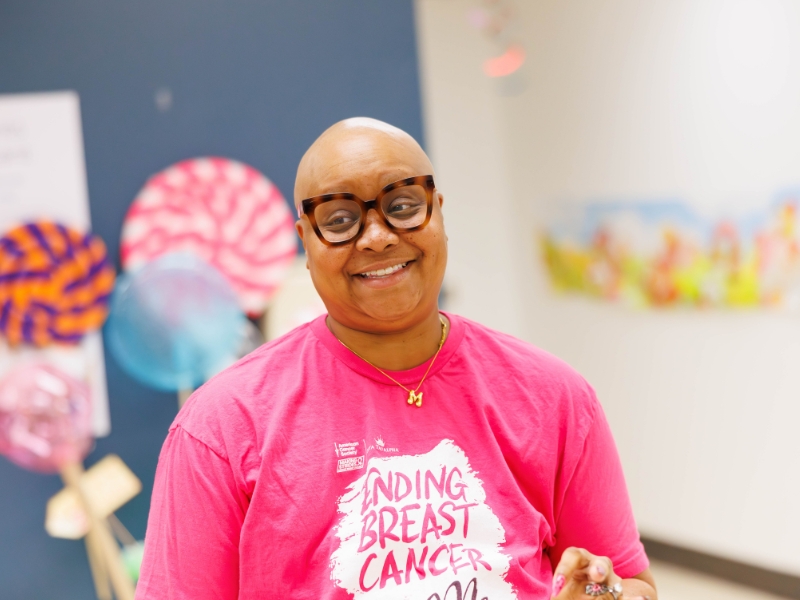
Meaghan Odum has a lot of titles: wife, mother, manager, doctoral student, volunteer, influencer and sommelier, to name a few.
She and her care team from the University of Mississippi Medical Center are adding one more: breast cancer survivor.
“When I first met Dr. (Barbara) Craft, she said, ‘We’re going to take good care of you,’” Odum said. “I told her I was going to be a miracle, and she said, ‘Yes, you are.’ I can’t say enough about my care team – I love them.”
Diagnosed with breast cancer five days after a hysterectomy in 2024, Odum called the Cancer Center and Research Institute (CCRI) at UMMC in search of a way forward.
“I couldn’t think of the next steps to take,” she said. “I called and left a message saying that I had just been diagnosed and needed help. I was crying on the phone.”
Less than a day later, Odum, then 38, was meeting Craft, professor of medicine in UMMC’s Division of Oncology, director of the Breast Cancer Treatment and Prevention Program and a clinical member of CCRI, and the rest of her care team.
Tests showed she had a rare and aggressive form of inflammatory breast cancer, which accounts for about 1% to 5% of all breast cancers diagnosed in the U.S. In this form of breast cancer, cancer cells block lymph vessels, causing the affected breast to look swollen or inflamed.
Younger women affected
Odum, of Jackson, is one of a growing number of younger women diagnosed with breast cancer. While the median age of those diagnosed with breast cancer is 62, the breast cancer incidence rate in women younger than 50 has risen faster (about 1.4% each year between 2012–2022) than in women older than 50 (about 1% each year).
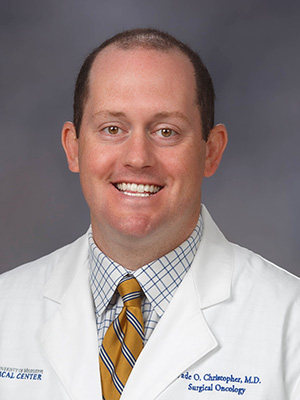
“This is a national trend,” said Dr. Wade Christopher, assistant professor of surgery and a specialist in the surgical treatment of breast cancer. “Breast cancer screening through self-examination, check-ups and mammography is essential for women’s health."
The CCRI care team moved quickly on Odum’s case. There were a mammogram and an MRI on a Thursday, a PET scan Friday and another biopsy on Monday. The next day, Christopher was placing a port for blood draws, injections and infusions. On Wednesday, there was an Echo, and then, on Thursday, Odum was having her first dose of chemotherapy.
“I was praying,” she said, “because that’s what I do.”
Odum was receiving Adriamycin, called “the red devil” because of its color and the side effects such as nausea and tiredness that follow. “I call it ‘the blood of Christ' instead, and I want that.”
Eight rounds of chemotherapy gave Odum side effects including neuropathy and hot flashes, and she lost her hair, which had been in braids. The treatments worked, shrinking her cancer from 8 centimeters to 1 centimeter or less, she said.
She then underwent a double mastectomy and had 17 lymph nodes removed. Then came 30 radiation treatments.
With her every step of the journey is her husband, Allen Odum Jr.
“He’s been wonderful,” she said. “When I’ve felt discouraged, he has been there to hold my hand and sit with me through it all.”
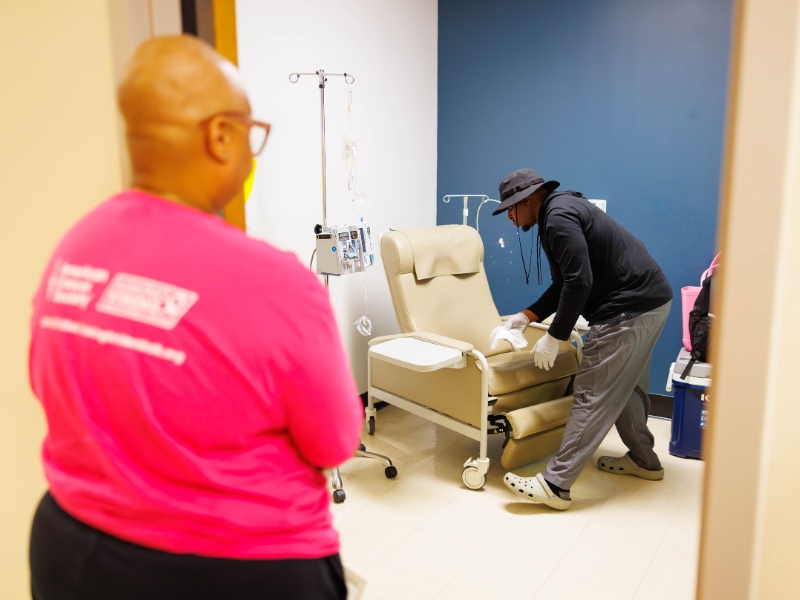
Another battle
This spring, three months after her mastectomy, a PET scan showed cancer had showed up in a lymph node on the opposite side of the ones removed. Craft recommended a biopsy to make sure.
“This was traumatic,” Odum said, “because I had been through so much. I was a wreck that day.”
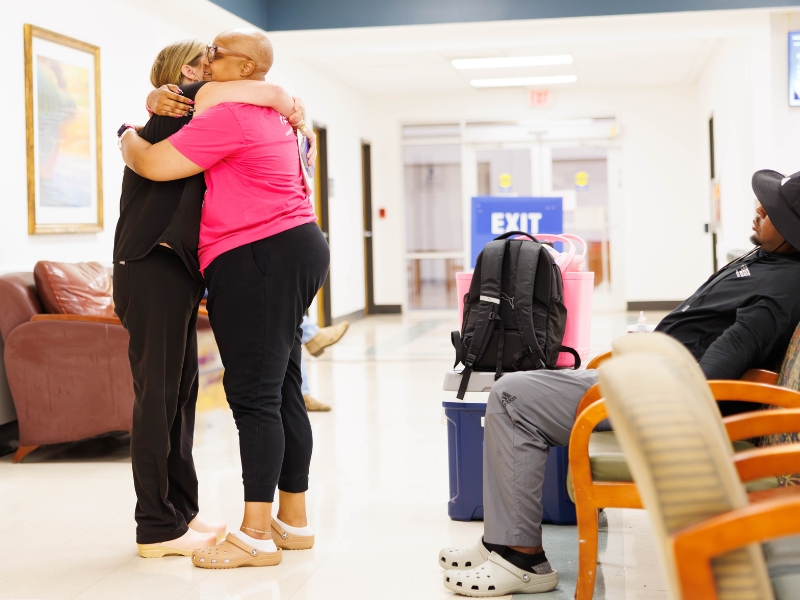
Her care team, she said, “were in tears. Everyone was crying.”
She got the biopsy the same day. “I was experiencing a wave of emotions,” she said. “What did I do to deserve this? I was constantly blaming myself, even though none of this was my fault.”
Odum had a business trip to Washington state planned, but she was ready to fight the 2.5-centimeter tumor in her lymph node when she returned.
This time, the chemotherapy was different, but she still lost the hair she was beginning to grow back.
Allen Odum said his wife’s main job is to get well.
“She’s been my best friend for 26 years – ever since our first day at Horn Lake High School,” he said. “I take care of her and take as much as I can off her plate so she can rest and focus on her health.”
His care includes packing for her infusions, making sure her computer, comfortable pillows and blankets, plus a cooler with drinks and snacks are ready.
On the weekends, the family and their circle of friends celebrate “Sunday Fundays,” a time when Odum’s team of supporters come over to share a meal, a glass of wine and fellowship.
Screening saves lives
Breast cancer screening is essential for early diagnosis, when survival rates can be as high as 99%.
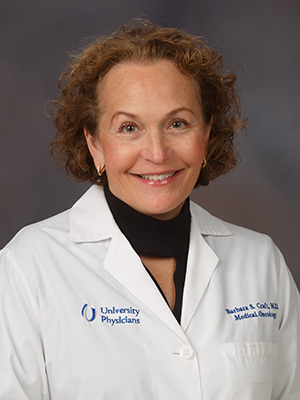
According to the American College of Radiology, mammograms are recommended every year starting at 40 for average-risk women. But for some people who may be considered higher risk, a formal risk assessment should be done at age 25, Craft said.
“We’re still seeing the ramifications of COVID,” she said, “when women delayed coming in for breast cancer screening. Some haven’t come in since.”
Since breast cancer can also occur in men, it’s important for them to be aware of changes, too, she said.
Breast cancer patients at UMMC have a roomful of doctors in their corner, Christopher said. Each week, experts in surgical oncology, medical oncology, pathology, radiation oncology, breast radiology, genetics and clinical trials meet at CCRI to collaborate on cases.
“We all work together,” he said. “We talk about each patient, review their test results, and develop a personalized treatment plan that gives them the best chance at recovery. It’s a team approach that ensures no detail is overlooked.”
Telehealth cancer care is also provided through programs such as Survivor University, a free online program for adults with a cancer diagnosis. Sessions are held throughout the year, and recorded classes on topics ranging from nutrition and wellness to side effects of treatment are available online.
Advances in breast cancer treatment include targeted therapies with fewer side effects and surgeries that are less intrusive.
‘Too much more to offer’
For Odum and her family, life goes on. The Odums are parents to Alivia, 16, and Allen III, 7. She works from home as a clinic operations manager for a health care software company and is working toward a Doctor of Health Administration degree from Oklahoma State University online. She’s also an active member of the Junior League of Jackson and the Jackson Symphony League, chairing the Junior League’s Jackson Pantry project that provides healthy food to Jackson Public Schools families each month and the Symphony League’s annual gala.
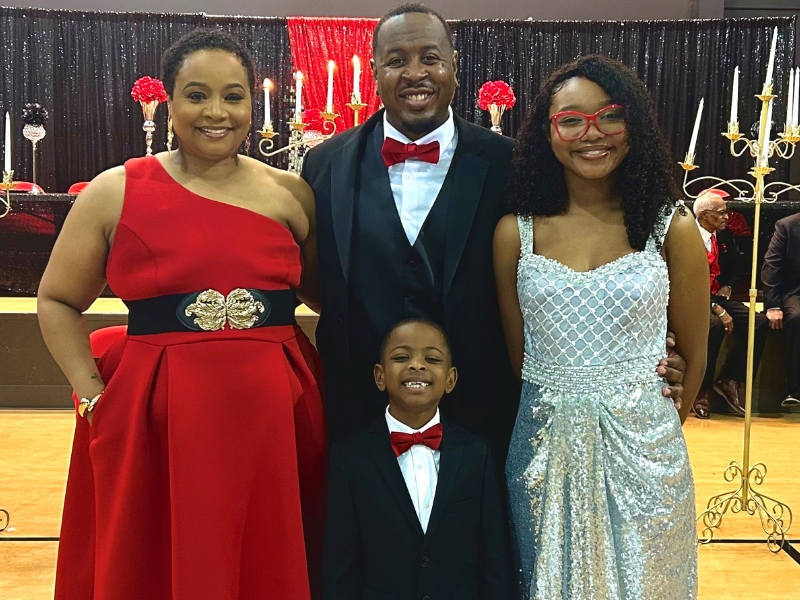
On Instagram, Odum creates content as @TrillWineWife, an account with more than 10,500 followers. She says she was the first Black female sommelier in the state.
“Life doesn’t stop,” she said. “You can’t just stop doing these things. You make life around your appointments. I’ve got too much more to offer to let breast cancer stop me.”


